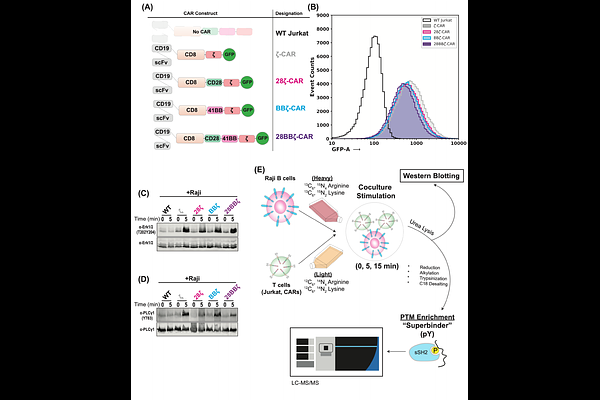Inclusion of the ζ-chain drives phosphotyrosine signalling in CD19-CAR T cells

Inclusion of the ζ-chain drives phosphotyrosine signalling in CD19-CAR T cells
Callahan, A.; Puterbaugh, R. Z.; Ro, T.; Zhang, X.; Su, X.; Salomon, A.
AbstractAlthough chimeric antigen receptor (CAR) T cell therapy has revolutionised individualised cancer therapies for relapsed/refractory lymphomas, signalling mechanisms underlying CAR T activation remain incompletely understood, especially among the three generations of CAR T exploiting different signalling domains. Here, using Jurkat T cell as a model, we investigate how costimulation influences tyrosine phosphorylation cascades using LC-MS/MS based phosphotyrosine (pY) proteomics and CD69 expression in the presence of small molecule inhibitors of key TCR signalling regulators. We find that including the {zeta}-chain in first ({zeta}-CAR), second (28{zeta}-CAR and BB{zeta}-CAR), and third (28BB{zeta}-CAR) generation CARs largely determines pY signalling, irrespective of costimulation. Further, we show that the phosphatase activity of PTPN22 and SHP-1 are largely negligible for activation of CARs, but indiscriminate inhibition of phosphatases using Pervanadate (PV) selectively activates BB{zeta}-CARs without antigen encounter. Finally, we find that selective, partial inhibition of Itk using Soquelitinib reduces basal CD69 expression in Jurkat CAR T cells while maintaining their ability to activate in response to antigen. Our data suggest that the {zeta}-chain determines the pY signalling profile of CD19-CAR Jurkat T cells and that Itk may drive antigen-independent CD19-CAR activation.